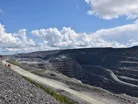Glencore concentrates copper experts in Quebec

Glencore, one of the world's largest diversified global natural resource companies, has announced the inauguration of its new Rouyn-Noranda office, located in Abitibi-Témiscamingue region of Quebec.
This new centre of expertise brings together more than 60 professionals from the copper division, who will support the company's activities in North America and Philippines.
Local expertise, international outreach
"The expertise of our Rouyn-Noranda staff in metallurgy and recycling is recognised throughout the world. This expertise is required not only for our local activities, but also for Glencore's operations in North America and Philippines. It therefore became beneficial to bring together different teams in the same location and ensure that workspaces could be offered to everyone.” said Claude Bélanger, Chief Operating Officer for North America and Philippines copper assets.
An essential support to the energy transition
The opening of the Rouyn-Noranda office comes as Glencore adapts its activities to meet the needs generated by the global transition toward sustainable transportation and clean energy, which requires significant volumes of base and precious metals.
Bélanger added: "Electrification requires a lot of copper and Glencore plays a central role in the supply chain of this strategic metal. Over the coming years, Rouyn-Noranda employees will improve this supply chain so that it meets the needs of emerging industries.
"Besides leading the Aeris project, which will bring about the complete modernisation of the Horne smelter, Rouyn-Noranda employees will be called upon to support initiatives that will allow Glencore copper to provide the strategic metals necessary for the energy transition in a more efficient and sustainable way."
The Aeris project represents the largest modernisation initiative in the history of the Horne smelter, Canada’s only operating copper smelter, with investments of more than US$500m to significantly reduce the site's overall emissions, modernise certain stages of the production process and increase recycling capacities.
Applying circular economy principles
Bélanger concluded: "The value-added cycle of copper already integrates many principles of the circular economy, and we will be able to increase this circularity thanks to the contribution of Rouyn-Noranda staff. It is therefore with pride that I inaugurate these new offices, which will allow Glencore to benefit from the region's talent and promote its expertise abroad."
Glencore's net zero by 2050 ambition
Glencore is the world's largest mining company, based on the 2023 ranking of the leading mining companies worldwide based on revenue published by Statista. It is a major producer and marketer of more than 60 commodities that advance everyday life. Through a network of assets, customers and suppliers that spans the globe, it produces, processes, recycles, sources, markets and distributes the commodities that support decarbonisation while meeting the energy needs of today.
With around 140,000 employees and contractors and a strong footprint in over 35 countries in both established and emerging regions for natural resources, Glencore's marketing and industrial activities are supported by a global network of more than 40 offices.
The company recognises its responsibility to contribute to the global effort to achieve the goals of the Paris Agreement by decarbonising its own operational footprint.
Its decarbonisation statement claims: “We believe that we should take a holistic approach and have considered our commitment through the lens of our global industrial emissions. Against a 2019 baseline, we are committed to reducing our Scope 1, 2 and 3 industrial emissions by 15% by the end of 2026, 50% by the end of 2035 and we have an ambition to achieve net zero industrial emissions by the end of 2050.”
